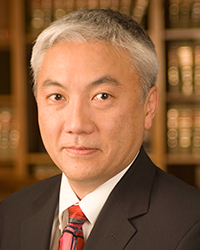The Honorable Mike Nakagawa

What is your teaching philosophy?
I try to relate the subjects I teach, whether it is Bankruptcy Law or Remedies, to current events. There are economic and social issues in the news every day that affect all of us, including (and sometimes especially), students. I also try to tailor the class discussions to the students before me. Not only is UNLV a melting pot in general, but I have students from so many different backgrounds and experiences seeking to become lawyers. Whether they are recent college graduates following a predetermined path, individuals wanting a new career, or professionals seeking to expand their credentials, their views are important. Students learn by listening and judges should too. My hope is that each student gets something useful from each course regardless of the field of law they pursue. Bankruptcy Law and Remedies are particularly fun to teach because both courses encompass so many areas of substantive law.
What is unique about bankruptcy practice?
There is a reason why bankruptcy practice covers so many legal disciplines. Businesses seek to reorganize in bankruptcy, but their success depends on whether they can comply with other applicable law, e.g., gaming regulations, health code requirements, and the like. Individuals seek a fresh start on their financial lives, but the assets they can keep largely depends on applicable state laws, e.g., exemptions, foreclosure rules, and the like. So even though the Constitution requires the enactment of uniform bankruptcy laws, practice under the Bankruptcy Code is anything but uniform. Thankfully, bankruptcy is a relatively small practice area, so civility and collegiality amongst members of most local bankruptcy bars is prized. I frequently ask students how they would address misbehavior by an opposing attorney, whether it is from a member of a small local bar, or, from counsel with no future relationship. The responses are always interesting.
What is the most significant issue facing your field today?
Student loan debt. It is a $1.6 trillion-dollar problem right now and is growing every day. Congress could change the Bankruptcy Code to allow student loans to be discharged as easily as home loans, but taxpayers would bear the burden of unpaid government-backed loans. The amount of accumulated student loan debt certainly affects the choices that Boyd graduates make, as well as other students, in seeking and accepting employment. In turn, those choices impact whether students have the resources to start families, purchase homes, or create new businesses. Because student loans generally are not secured by real estate, Congress apparently has chosen to reduce the risk to the lending industry by preventing students from shedding their loans through bankruptcy. It is more important than ever that students, the public, and our lawmakers understand what is at stake.